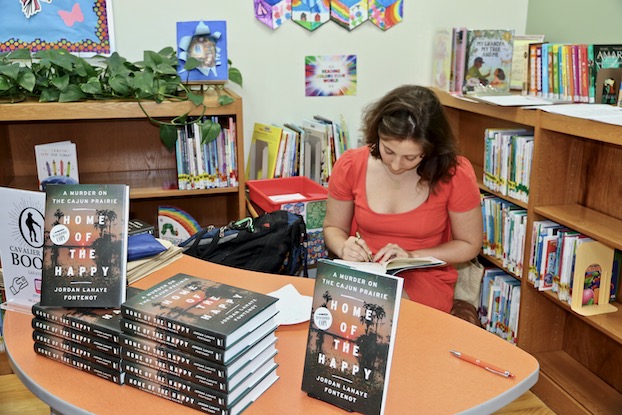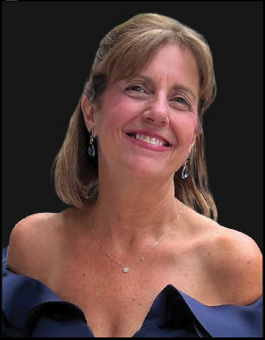‘Home of the Happy: A Murder on The Cajun Prairie’: New book looks at 1983 kidnapping, murder
Published 8:09 am Monday, June 23, 2025

- South Louisiana journalist and author Jordan LaHaye Fontenot signs copies of her book “Home of the Happy: A Murder on the Cajun Prairie” on Monday at the Elton Library. The book explores the kidnapping and murder of her great grandfather, Aubrey LaHaye, in 1983 in Evangeline Parish. (Doris Maricle / American Press)
Jordan LaHaye Fontenot grew up not knowing much about her late great-grandfather, Aubrey LaHaye, who was kidnapped and murdered in Evangeline Parish in 1983.
She knew he was taken from his home at knifepoint, and his wife, Emily, was left tied up after a man came to the house asking to use the couple’s telephone after having car trouble. His body was discovered in Bayou Nezpique 10 days after an extensive search involving local, federal and state law enforcement.
Growing up, Fontenot said she had limited knowledge of the tragedy because the family rarely talked about it, leaving many questions unanswered.
Trending
Fontenot recently wrote a true crime memoir titled “Home of the Happy: A Murder on The Cajun Prairie,” which explores the mysterious kidnapping and murder of her great-grandfather who she never knew and stories from her family.
“I think it’s a family story about a tragedy that still has a lot of questions left lingering,” she said, noting that her family has remained tight-lipped for years. “For me, it was an effort to answer some of them and just speak them into the world in a way that they haven’t been over these past 40 years.”
During a book signing Monday at the Elton Library, Fontenot said she started working on the project as part of her thesis project while majoring in English. She has a minor in journalism, which she uses today as the editor of Country Roads magazine.
“At first, it was more like an essay and it evolved into a book over the years with encouragement from my professor at the time and my Dad who began sharing more details about the event than I had ever heard before,” she said.
She decided to delve deeper into the long-unspoken family history by interviewing relatives while they were still able to share their recollections. Her grandfather, Dr. George Wayne LaHaye, the last surviving child of her great grandfather, was able to witness the book’s publication before his recent passing.
“The book follows me as I do the research mostly,” she said. “It goes back and forth into the scene and then me in first person. It describes what happened, but then also watches as I dig into court files and FBI records and conversations with my Dad about these questions that we still have.”
Trending
She spent nearly eight years scheduling numerous interviews, conducting extensive research, sifting through old newspaper articles, examining court files and FBI records and meticulously piecing the story together.
For the most part, people, including close family members, were generous in sharing their versions of the story, she said.
“There’s some people who are pretty uncomfortable with all of this being just out in the world, and it’s a lot of stuff that they kind of put in the past as a way to get forward and it’s coming back up,” she said. “But they all have been very supportive of me which I appreciate because this is in many ways more their story than it is mine.”
Fontenot said writing the book was challenging at times simply because of the sensitive nature of the subject of the matter and its connection to her family.
“It becomes very personal and this all happened before I was even born,” she said. “There were parts that were really hard to write and hard to do interviews because they were very emotional.”
Her father has been her biggest support throughout the project.
“I wouldn’t have felt comfortable doing it without that support,” she said.
Despite completing the book, Fontenot says many aspects of the case remain unresolved, and rumors persist even decades later. With the passage of time, the loss of records, and the passing of individuals, these questions may never be fully answered, she said.
John Brady Balfa was convicted of LaHaye’s murder in 1985, although some individuals harbor doubts regarding his involvement. Fontenot said she intends to leave the final judgement to her readers.
Balfa, who is currently serving a life sentence at Angola State Penitentiary, continues to pursue appeals based on what he claims is withheld evidence.
He is the nephew of renowned Cajun musician Dewey Balfa, and his father, Harry, was an accordion player in the Balfa Brothers’ band.
Fontenot reached out to Balfa requesting a meeting, noting that he has never met with any members of the LaHaye family. His response was a Christmas card simply signed “Merry Christmas.”
Fontenot describes her book, despite its focus on the murder, as both a love letter to Evangeline Parish and an investigative piece.
“I think readers from this area are going to see a lot of places that they recognize and names that are familiar, and that’s been kind of interesting feedback from people from here so far,” she said, adding that she also learned a lot about South Louisiana, including the complexities of its people and the importance of storytelling in its culture.
Looking ahead, Fontenot hopes to write another book, though the subject and format are still undetermined.
“I think there’s a collection of essays that exist in my brain somewhere that will come out eventually, and then there’s some stories that I’d like to play around with like fiction stuff, but I’ve never published fictions yet, so I’m a little more uncomfortable in that world, but we’ll see,” she said.





